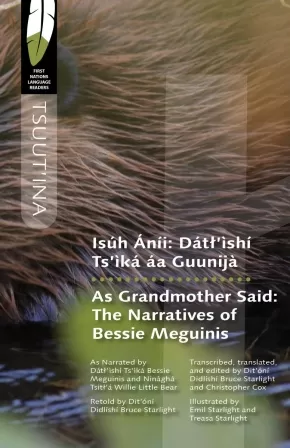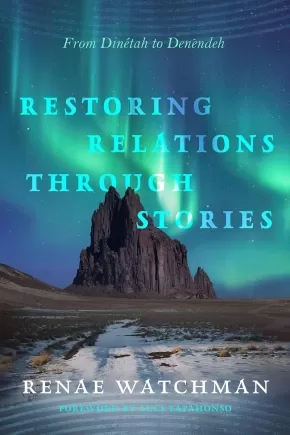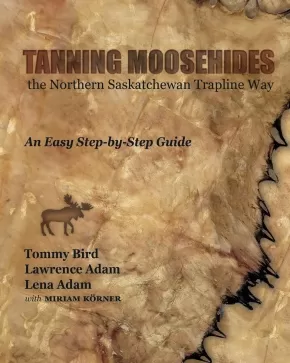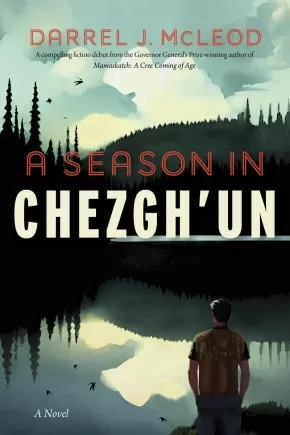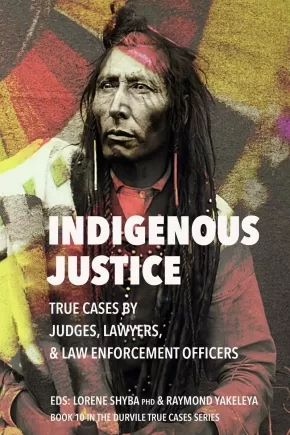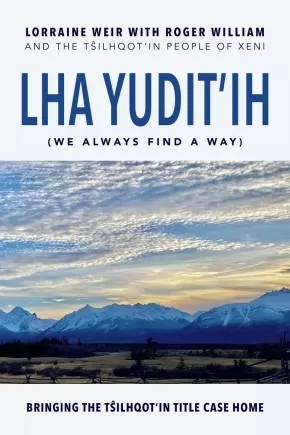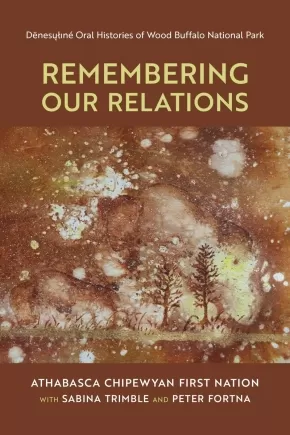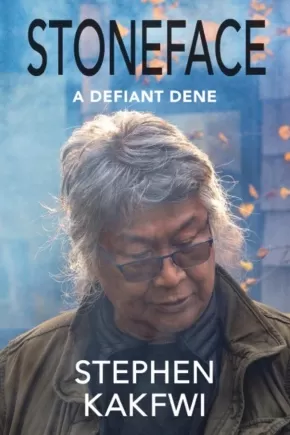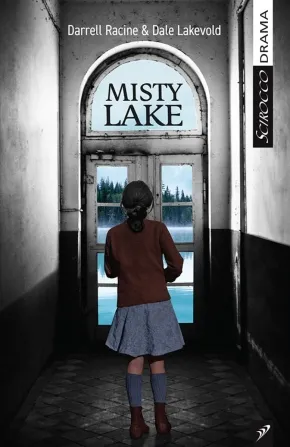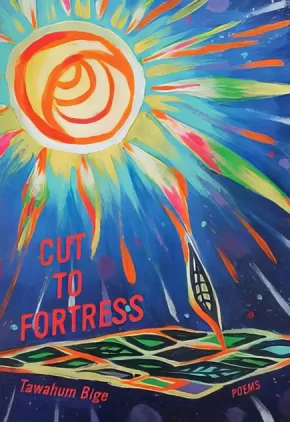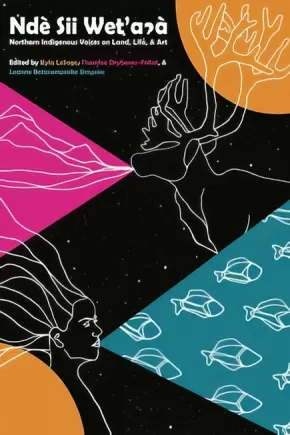
Dene
16
-
30
of
63 Results;
Sort By
Go To
of 5
Hòt'a! Enough!: Georges Erasmus's Fifty-Year Battle for Indigenous Rights
$28.99
Format:
Paperback
Text Content Territories:
Indigenous Canadian; First Nations; Dene;
Reading Level: N/A
ISBN / Barcode: 9781459752900
Synopsis:
Synopsis:
The political life of Dene leader Georges Erasmus - a radical Native rights crusader widely regarded as one of the most important Indigenous leaders of the past fifty years.
For decades, Georges Erasmus led the fight for Indigenous rights. From the Berger Inquiry to the Canadian constitutional talks to the Oka Crisis, Georges was a significant figure in Canada's political landscape. In the 1990s, he led the Royal Commission on Aboriginal Peoples and afterward was chair and president of the Aboriginal Healing Foundation, around the time that Canada's residential school system became an ongoing frontpage story.
Georges's five-decade battle for Indigenous rights took him around the world and saw him sitting across the table from prime ministers and premiers. In the 1980s, when Georges was the National Chief of the Assembly of First Nations, he was referred to as the "Thirteenth Premier." This book tells the personal story of his life as a leading Indigenous figure, taking the reader inside some of Canada's biggest crises and challenges.
Awards
- 2025 Indigenous Voices Awards - Prose in English Award
Additional Information
320 pages | 6.00" x 9.00" | 57 b&w illustrations | Paperback
Isúh Áníi / As Grandmother Said: Dátl'ìshí Ts'ìká áa Guunijà / The Narratives of Bessie Meguinis
$24.95
Format:
Paperback
Text Content Territories:
Indigenous Canadian; First Nations; Dene; Tsuut’ina (Tsuu T'ina, Sarcee);
Grade Levels: 12; University/College;
ISBN / Barcode: 9780889779853
Synopsis:
Synopsis:
The first book published in Tsuut’ina—a critically endangered language—in over a century!
With fewer than 150 speakers, Tsuut’ina is a critically endangered language. Isúh Áníi / As Grandmother Said brings together nine traditional narratives and historical accounts in the Tsuut’ina language, originally narrated by Elders Dátł’ìshí Ts’ìká Bessie Meguinis (1883–1987) and Ninàghá Tsìtł’á Willie Little Bear (1912–1989). At once an act of language preservation and a learning resource, each story is retold in Tsuut’ina by Dit’óní Didlíshí Dr. Bruce Starlight and is presented with English translations and a Tsuut’ina-to-English glossary.
The narratives included in this collection cover considerable ground, ranging from the creation of the world in the caring hands of Xàlítsa-tsii and his animal helpers, to accounts of separation, migration, and cross-cultural contact that mark major turning points in Tsuut’ina history, and to important cultural and ceremonial items and practices that the Tsuut’ina Nation maintains to this day.
These stories will be of lasting value to Tsuut’ina language learners and teachers, and will share the legacy of Elders Bessie Meguinis and Willie Little Bear with generations of Tsuut’ina to come.
Educator & Series Information
This book is part of the First Nation Language Readers series. With a mix of traditional and new stories, each First Nations Language Reader introduces an Indigenous language and demonstrates how each language is used today.
Additional Information
186 pages | 5.50" x 8.50" | Paperback
Restoring Relations Through Stories: From Dinétah to Denendeh
$35.95
Format:
Paperback
Text Content Territories:
Indigenous American; Native American; Navajo (Diné); Indigenous Canadian; First Nations; Dene;
Reading Level: N/A
ISBN / Barcode: 9781779400031
Synopsis:
Synopsis:
Restoring Relations Through Stories introduces, synthesizes, and analyzes traditional stories by Diné and Dene storytellers in orature and film. The book conceptualizes narrative autonomy as hane’tonomy and visual storytelling from a Diné perspective, offering a map for re-storying that resists inauthentic and misappropriated stories. Watchman centres Indigenous narratives and examines how these narratives are tied to land and relations.
In the book’s final movement, the author explores the power of story to forge ancestral and kinship ties between the Diné and Dene, across time and space, through re-storying of relations.
Reviews
“Watchman shows how the old stories, maintained over centuries . . . tie together the Diné and Dene through ancestral and linguistic connections. The works that are surveyed herein reinforce the import of remembering, retelling, and revising the old stories so that they are germane today.” —Luci Tapahonso, inaugural Poet Laureat of the Navajo Nation
“Restoring Relations Through Stories shows how land-based storying among Diné and Dene peoples is strong and continues in the twenty-first century and beyond. It demonstrates how Indigenous peoples continue to remain connected to the land and sustain distinctive ways of life through their narratives, lands, and filmmaking.” —Lloyd L. Lee, author of Diné Identity in a Twenty-First Century World
“Renae Watchman’s Restoring Relations Through Stories introduces readers to the powerful force of ‘Hane’tonomy’ and the work of Diné creatives who refuse misappropriated and inauthentic views by advancing decisive versions of their world. Hane’tonomy provides us all with a new framework for understanding complex works such as Sydney Freeland’s Drunktown’s Finest, Blackhorse Lowe’s 5th World, or Hollywood’s deracinating obsession with the Navajo Nation and Shiprock as a backdrop. It moves toward a meaningful, though potentially daunting, provocation in forging new connections through restorying with ancestral kin of the Diné in present-day Canada.” —Jeff Berglund, co-editor of The Diné Reader: An Anthology of Navajo Literature
“An affirmation of our continued connections to the Mother Earth through prayers, songs, and stories. The connections to each other as Diné and Dene are remembered in Watchman’s stories of placemaking.” —Jennifer Nez Denetdale, professor and Chair of American Studies, University of New Mexico
Additional Information
356 pages | 5.00" x 8.00"| Paperback
Roth
$29.99
Artists:
Format:
Paperback
Text Content Territories:
Indigenous Canadian; First Nations; Dene;
ISBN / Barcode: 9781989754221
Synopsis:
Synopsis:
Unless there is snow on the ground, never speak their name aloud.
The more they eat the hungrier they become, and they are starving.
They were meant to stay undisturbed, their dismembered limbs scattered, frozen under the permafrost, but as is always the way, the greed of industry has unburied them once more. Now, the most feared, the Wheetago, have returned, using their powers to call back the Na acho, cannibalistic giants once banished by Dene deities.
The revered hero known as the Child Finder who is fighting to cling to his humanity after a Wheetago attack, a mother and her young son, and a desperate band of convicts, form an uneasy alliance to survive the Wheetago horrors now awakened.
ROTH, from award-winning, bestselling Tlicho Dene author Richard Van Camp, and visionary illustrator Christopher Shy is the first graphic novel in the Wheetago War series.
Reviews
"A storyteller is what Richard Van Camp is—a storyteller par excellence. He tells us of family and traditions, of past and present spirits. Through Roth, he weaves his magic yet again, entwined with the richly atmospheric and terrestrial palette of Christopher Shy. With the Wheetago War series, kind-hearted and horrifically evil come together to hold you fully embraced, page after page."– Kent Williams artist & illustrator X-Men, Batman
"This spectacular, boundary-pushing book will change the way you look at graphic novels.Rooted in ancient and powerful narratives, this captivating saga will have you holding your breath until it releases you from its grip at the end, only to want more.”- Waubgeshig Rice, author Moon of the Turning Leaves
Educator & Series Information
Recommended for ages 15+.
This book is the first book in the Wheetago War series.
Additional Information
192 pages | 6.62" x 10.25" | Paperback
Tanning Moosehides: The Northern Saskatchewan Trapline Way
$49.95
Format:
Coil Bound
Text Content Territories:
Indigenous Canadian; First Nations; Dene; Denesuline (Chipewyan); Fond du Lac Denes??iné First Nation; Cree (Nehiyawak); Woodland Cree; Rocky Cree; Peter Ballantyne Cree Nation;
ISBN / Barcode: 97817786903
Synopsis:
Synopsis:
Denesųłiné Elders Lawrence and Lena Adam have been tanning hides and sharing their knowledge with others for more than four decades. Woodland Cree knowledge carrier Tommy Bird helped his family tan hides on the trapline as a young boy. Together they share their lifetime of experience to guide a new generation of hide tanners to keep the tradition alive. The trouble-shooting tips and hands-on advice in this book will help you to make your own bone tools and turn raw moosehides into smoke-tanned hides soft enough to sew into mitts or moccasins. Combining traditional knowledge with easy-to-follow instructions and detailed colour photos, Tanning Moosehides the Northern Saskatchewan Trapline Way is a practical guide you will refer to again and again.
Educator Information
The publisher recommends this resource for ages 10+
Recommended in the Indigenous Books for Schools catalogue as a valuable resource for Art, Science, and Social Studies in grades 5 to 12.
Themes: Animals, Arts and Culture, Cultural Teachings, Fashion, Traditional Knowledge.
Additional Information
64 pages | 8.50" x 11.00" | Spiral Bound
A Season in Chezgh'un: A Novel
$24.95
Format:
Paperback
Text Content Territories:
Indigenous Canadian; First Nations; Cree (Nehiyawak); Dene; Dakelh (Carrier);
Reading Level: N/A
ISBN / Barcode: 9781771623629
Synopsis:
Synopsis:
A subversive novel by acclaimed Cree author Darrel J. McLeod, infused with the contradictory triumph and pain of finding conventional success in a world that feels alien.
James, a talented and conflicted Cree man from a tiny settlement in Northern Alberta, has settled into a comfortable middle-class life in Kitsilano, a trendy neighbourhood of Vancouver. He is living the life he had once dreamed of—travel, a charming circle of sophisticated friends, a promising career and a loving relationship with a caring man—but he chafes at being assimilated into mainstream society, removed from his people and culture.
The untimely death of James’s mother, his only link to his extended family and community, propels him into a quest to reconnect with his roots. He secures a job as a principal in a remote northern Dakelh community but quickly learns that life there isn’t the fix he’d hoped it would be: His encounters with poverty, cultural disruption and abuse conjure ghosts from his past that drive him toward self-destruction. During the single year he spends in northern BC, James takes solace in the richness of the Dakelh culture—the indomitable spirit of the people, and the splendour of nature—all the while fighting to keep his dark side from destroying his life.
Reviews
“MacLeod offers the reader a thought-provoking and immersive portrait of a remote Dakelh community and of James, the driven Indigiqueer educator who chooses to work there—a man who must struggle with structural injustices, conflicting demands, prejudice, and his own divided self. A deeply authentic novel, and one that is both educative and heartfelt.” — Kathy Page, author of Alphabet and Dear Evelyn
“In A Season in Chezgh'un, Darrel J. McLeod moves confidently from the world of memoir to the new territory of the novel.” — Michelle Good, author of Five Little Indians
“A Season in Chezgh’un is about the search for meaning and for love, about grappling with history and loss, about creating a future out of quiet daring. I love the elegance of languages and cultures intermingling in this story, Cree, Dene, Nehiyaw, French, Spanish. Beautifully crafted, this novel is alive with dialogue that takes us into the hearts of characters too often left voiceless. Let this book sweep you away.” — Kim Echlin, author of Speak, Silence
Additional Information
320 pages | 6.00" x 9.00" | Paperback
Indigenous Justice: True Cases by Judges, Lawyers, and Law Enforcement Officers
$35.00
Editors:
Format:
Paperback
Text Content Territories:
Indigenous Canadian;
ISBN / Barcode: 9781990735264
Synopsis:
Synopsis:
In the spirit of truth and reconciliation, judges, lawyers, and law enforcement officers write about working with First Nations, Métis, and Inuit Peoples through their trials and tribulations with the criminal justice system. The stories are a mix of previously published essays from the Durvile True Cases anthologies with an equal number of new chapters by legal and law enforcement professionals including Justice Thomas Berger (posthumous), Justice Nancy Morrison, Justice John Reilly, Senator Kim Pate, lawyers Eleanore Sunchild, Brian Beresh, and John L. Hill, and parole and police officers Doug Heckbert, Ernie Louttit, Val Hoglund, and Sharon Bourque.
Reviews
“I’m struck by how the True Cases series has a multiplicity of authentic perspectives that are able to be our proxy or conduit into amazing worlds... Stories that are happening in our community and to our neighbours that we should know about but don’t.” —Grant Stovers, CKUA Radio
Additional Information
288 pages | 6.00" x 9.00" | Paperback
Lha yudit’ih (We Always Find a Way): Bringing the Tŝilhqot’in Title Case Home
$35.00
Format:
Paperback
Text Content Territories:
Indigenous Canadian; First Nations; Dene; Tsilhqot'in (Chilcotin);
Reading Level: N/A
ISBN / Barcode: 9781772013825
Synopsis:
Synopsis:
Eight years in the making, Lha yudit’ih (We Always Find a Way) is a community oral history of Tsilhqot’in Nation v. British Columbia, the first case in Canada to result in a declaration of Aboriginal Rights and Title to a specific piece of land. Told from the perspective of the Plaintiff, Chief Roger William, joined by fifty Xeni Gwet’ins, Tŝilhqot’ins, and allies, this book encompasses ancient stories of creation, modern stories of genocide through smallpox and residential school, and stories of resistance including the Tŝilhqot’in War, direct actions against logging and mining, and the twenty-five-year battle in Canadian courts to win recognition of what Tŝilhqot’ins never gave up and have always known. “We are the land,” as Chief Roger says. After the violence of colonialism, he understands the court case as “bringing our sight back.” This book witnesses the power of that vision, its continuity with the Tŝilhqot’in world before the arrival of colonizers two centuries ago, and its potential for a future of freedom and self-determination for the Tŝilhqot’in People.
Additional Information
480 pages | 6.49" x 9.48" | 32 page colour photograph insert and black and white photos and illustrations and maps throughout | Paperback
Remembering Our Relations: Dënesųłıné Oral Histories of Wood Buffalo National Park
$34.99
Format:
Paperback
Text Content Territories:
Indigenous Canadian; First Nations; Dene; Denesuline (Chipewyan);
Reading Level: N/A
ISBN / Barcode: 9781773854113
Synopsis:
Synopsis:
Elders and leaders remind us that telling and amplifying histories is key for healing. Remembering Our Relations is an ambitious collaborative oral history project that shares the story of Wood Buffalo National Park and the Dënesųłıné peoples it displaced.
Wood Buffalo National Park is located in the heart of Dënesųłıné homelands, where Dené people have lived from time immemorial. Central to the creation, expansion, and management of this park, Canada’s largest at nearly 45, 000 square kilometers, was the eviction of Dënesųłıné people from their home, the forced separation of Dene families, and restriction of their Treaty rights.
Remembering Our Relations tells the history of Wood Buffalo National Park from a Dene perspective and within the context of Treaty 8. Oral history and testimony from Dene Elders, knowledge-holders, leaders, and community members place Dënesųłıné voices first. With supporting archival research, this book demonstrates how the founding, expansion, and management of Wood Buffalo National Park fits into a wider pattern of promises broken by settler colonial governments managing land use throughout the twentieth and twenty-first centuries.
By prioritizing Dënesųłıné histories Remembering Our Relations deliberately challenges how Dene experiences have been erased, and how this erasure has been used to justify violence against Dënesųłıné homelands and people. Amplifying the voices and lives of the past, present, and future, Remembering Our Relations is a crucial step in the journey for healing and justice Dënesųłıné peoples have been pursuing for over a century.
Additional Information
352 pages | 6.00" x 9.00" | Paperback
Stoneface: A Defiant Dene
$28.00
Format:
Paperback
Text Content Territories:
Indigenous Canadian; First Nations; Dene;
Reading Level: N/A
ISBN / Barcode: 9781773861074
Synopsis:
Synopsis:
Stephen Kakfwi was born in a bush camp on the edge of the Arctic Circle in 1950. In a family torn apart by tuberculosis, alcohol and the traumas endured by generations in residential school, he emerged as a respected Dene elder and eventually the Premier of the Northwest Territories.
Stephen belongs to a cohort of young northerners who survived the childhood abuses of residential school only to find themselves as teenagers in another residential school where one Oblate father saw them as the next generation of leaders, and gave them the skills they would need to succeed. Kakfwi, schooled on civil rights and 1960s protest songs, dedicated himself to supporting chiefs in their claim to land that had been taken away from them and in their determination to seize control of the colonial political system.
Kakfwi’s life has been a series of diverse endeavours, blending traditional Dene practices with the daily demands of political office—hunting moose one day and negotiating with European diamond merchants the next. Throughout his career, Kakfwi understood that he held the power to make change—sometimes he succeeded, sometimes he did not. But he also embraced the power of story-telling, and has helped change the story of the North.
Kakfwi combines his remarkable memory for detail with his compelling raconteur’s skill in taking us through the incredible story of his life and one of the most transformative times in Canadian history. In his candid description of the loneliness of leadership and his embrace of Dene spirituality, Kakfwi’s Stoneface transforms politics into philosophy and an intensely personal guide to reconciliation.
Additional Information
240 pages | 6.00" x 9.00" | Paperback
The Misty Lake
$17.95
Format:
Paperback
Text Content Territories:
Indigenous Canadian; First Nations; Dene; Métis;
Reading Level: N/A
ISBN / Barcode: 9781990738302
Synopsis:
Synopsis:
Misty Lake tells the story of a young Metis journalist from Winnipeg who travels to a Dene reserve in Northern Manitoba to conduct an interview with a former residential school student. What Mary imparts in her interview will change Patty's life profoundly, allowing the journalist to make the connections to her own troubled life in the city. Patty knows that her Metis grandmother went to residential school when she was a girl. But Patty hasn't understood until now that she's inherited the traumatic legacy of residential school that was passed down to her mother from her grandmother. With this new understanding, Patty embarks on a healing journey. It will take her to the Dene fishing camp at Misty Lake, a place of healing, where, with Mary, she will learn that healing begins when you can talk about your life.
Additional Information
80 pages | 5.50" x 8.50" | Paperback
Cut to Fortress: Poems
$19.95
Format:
Paperback
Text Content Territories:
Indigenous Canadian; First Nations; Cree (Nehiyawak); Dene;
Reading Level: N/A
ISBN / Barcode: 9780889714168
Synopsis:
Synopsis:
A stunning debut poetry collection confronting colonialism, relationships, grief and intergenerational wounds.
Cut to Fortress considers the possibility of decolonization through a personal lens, urging for a resistance that is tied using cord and old-growth tree roots; a resistance that tethers us all together in this contemporary existence.
With an upbringing in Surrey, fraught familial conflicts, the passing of his older brother and its influence on his world view, Bige slices through the forts built overtop occupied Turtle Island to examine their origin and his own. His journey climbs into the mountains while he reconnects with his Dene and Cree cultures like a gripping hand on jagged rock. His path draws into the concrete urban streets that Wetako-medicine lurks through, especially for his people. The labour of these travels brings him to the springs where healing passed-down traumas becomes possible by drawing water through vulnerability.
Reviews
"The reinforcement of knowing the interconnectedness of all things—including the grime of (Vancouver) city and endangered forest beauty found within these lean staccato poems—ring with a desperate voice of “youth” who want to remain part of it all. Inspiration too, enacted in the listening and learning from those who have journeyed here before. Is this activism poetry, or reflections of a soul memory rife with humanity and new/old teachings of the way it could and can be?" — Janet Rogers
Additional Information
96 pages | 5.50" x 8.00" | Paperback
Dempsey Bob: In His Own Voice
$45.00
Format:
Hardcover
Text Content Territories:
Indigenous Canadian; First Nations; Dene; Tahltan (Nahanni); Tlingit;
Grade Levels: 12; University/College;
ISBN / Barcode: 9781773271613
Synopsis:
Synopsis:
Dempsey Bob: In His Own Voice is based on the first full-scale solo museum exhibition of this extraordinary Tahltan-Tlingit artist, one of the finest living carvers of the Northwest Coast. Drawing from extensive interviews with the artist by the exhibition’s curator, Sarah Milroy, the book presents the story of his life told his own way, including extensive and intimate reflections on the creation of particular works. Gorgeous photographs of the artworks, which are drawn from key private collections in Canada and public collections in Canada, the US and beyond, are supplemented with material from his sketchbooks to create a vivid portrait of the creative process.
Additional Information
208 pages | 9.00" x 10.00" | Hardcover
Kwändǖr
$25.00
Format:
Paperback
Text Content Territories:
Indigenous Canadian; First Nations; Dene; Tahltan (Nahanni);
Reading Level: N/A
ISBN / Barcode: 9781772620771
Synopsis:
Synopsis:
Indigenous Voices Award winner Cole Pauls returns with a robust collection of stories that celebrate the cultural practices and experiences of Dene and Arctic peoples. Gathering Pauls's comics from magazines, comic festivals and zine making workshops, these comics are his most personal work yet. You'll learn stories about the author's family, racism and identity, Yukon history, winter activities, Southern Tutchone language lessons and cultural practices. Have you ever wanted to learn how to Knuckle Hop? or to acknowledge and respect the Indigenous land you’re on? Or how to be an ally to Indigenous people? Well, gather around and hear this Kwändǖr! (Story!).
Additional Information
140 pages | 6.50" x 10.00" Paperback
Ndè Sii Wet'aà: Northern Indigenous Voices on Land, Life, & Art
$24.00
Format:
Paperback
Text Content Territories:
Indigenous Canadian; Inuit; Inuvialuit (Mackenzie Inuit); First Nations; Tutchone; Northern Tutchone; Dene; Tlicho (Dogrib); South Slavey (Deh Cho); North Slavey (Sahtu); Kaska Dena (Denek’eh); Denesuline (Chipewyan); Sayisi Dene; Cree (Nehiyawak); Métis; Indigenous American; Alaska Native; Dena?ina (Tanaina); Alutiiq (Sugpiaq);
Grade Levels: 12; University/College;
ISBN / Barcode: 9781927886625
Synopsis:
Synopsis:
Ndè Sii Wet'aà: Northern Indigenous Voices on Land, Life, & Art is a collection of essays, interviews, short stories and poetry written by emerging and established northern Indigenous writers and artists. Centred on land, cultural practice and northern life, this ground-breaking collection shares wealth of Dene (Gwichʼin, Sahtú, Dehcho, Tłı̨chǫ, Saysi, Kaska, Dënesuiné, W?ìl?ìdeh ) Inuit, Alutiiq, Inuvialuit, Métis, Nêhiyawak (Cree), Northern Tutchone, and Tanana Athabascan creative brilliance. Ndè Sii Wet'aà holds up the voices of women and Two Spirit and Queer writers to create a chorus of voices reflecting a deep love of Indigenous cultures, languages, homelands and the north. The book includes a series of pieces and interviews from established northern artists and musicians including Leela Gilday, Randy Baillargeon (lead singer for the W?ìl?ìdeh Drummers), Inuit sisters, song-writers and throat singers Tiffany Ayalik and Inuksuk Mackay of Piqsiq, Two Spirit Vuntut Gwitchin visual artist Jeneen Frei Njootli, Nunavik singer-songwriters Elisapie and Beatrice Deere and visual artist Camille Georgeson-Usher. Ndè Sii Wet'aà also includes writing from well-known northern writers Siku Allooloo, T'áncháy Redvers (Fireweed), Antione Mountain (From Bear Rock Mountain), Glen Coulthard (Red Skin, White Masks), Catherine Lafferty (Northern Wildflower, Land-Water-Sky) and Lianne Marie Leda Charlie, in amongst the best emerging writers in the north.
Additional Information
264 pages | 6.00" x 9.00" | Paperback
Sort By
Go To
of 5




